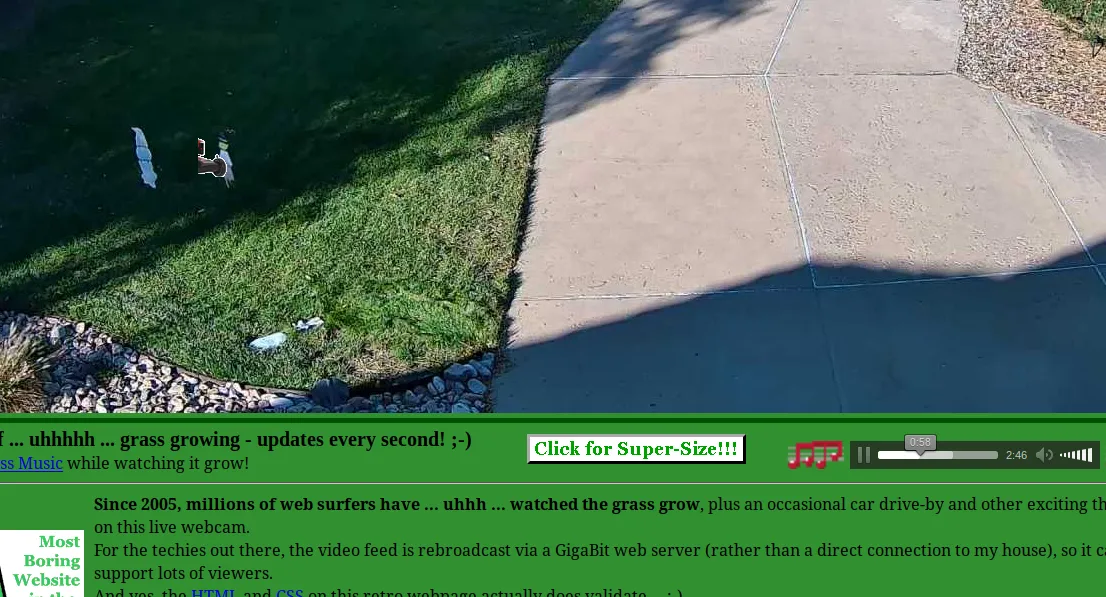on the small web

(Let me preface this by saying that in this post, I use a somewhat sarcastic tone for ironic effect-I have no intention of offending anyone.
If you're a lover of the small web and take offense very easily, you might want to skip this one.)
The small web is perfect for losing yourself-or maybe for finding something you didn't know you were looking for.
I took a little "trip" on Wiby, a (moderated) search engine for the small web.
How lovely, how fascinating.
Just start clicking randomly on the sites that pop up when you search for random words-or, if you're feeling lazy, hit the "Surprise me" button.
There's so much stuff that anyone might almost believe this is the "authentic" version of the web, the one that survived the algorithmic apocalypse.
Personally, I've come to a different conclusion: it's not the real web, but a parallel universe where the internet's cultural leftovers thrive, unfiltered and unoptimized.
Here, conspiracy theories, isolationism, and fundamentalism don't wear the sinister mask they do on Telegram or the dark web.
No, this is a dimension where content has value precisely because it's wrapped in the aesthetic of a bygone era-the uglier and more outdated a site looks, the more "trustworthy" it feels.
It's a place for tech tinkerers, IT professionals, and the kind of people who once wore "nerd" as a badge of honor and now greet you with "uwu" while decorating decentralized social media with a lot of multicoloured flags.
And yes, it's inclusive, but let's not pretend that inclusivity alone makes it immune to the quirks of its predominantly male (or male-adjacent) user base.
You'll find traditionalist Catholics who think the Pope is too progressive, the Vatican's official website (yes, really), die-hard Davidians, Marxist purists, vintage computer collectors, and UFO enthusiasts.
It's a refuge for anyone who ever posed a threat to the U.S. between the 1920s and the 1990s, and for those who romanticize the past because the present feels like a corporate dystopia.
There's a certain charm in that-like stumbling upon a time capsule where the internet still feels like a place rather than a product.
Then there are the blogs.
Unlike the performative noise of WordPress.com, these are actually read-by a handful of people, sure, but with a sincerity that's rare elsewhere.
Some are monotonous, others are raw and unfiltered snapshots of someone's life.
You'll find rants against Big Tech (often justified) and cozy, colorful corners of the web that feel like a warm hug after a soul-crushing day.
The quality gap between these blogs and the rest of the small web is vast, like the difference between a fossilized 1990s McDonald's burger and a fresh Crispy McBacon.
Neither is gourmet, but one won't leave you needing medical attention.
That said, the small web can also feel like a self-help group for people who'd rather diagnose themselves than seek real solutions.
How do you move beyond navel-gazing if there's no compelling reason for outsiders to care?
But this isn't the whole story.
Hidden among the ramblings, you'll find wiring diagrams for a Mazda RX-7, exhaustive guides to every type of arrow, and deep dives into obscure subcultures.
These pockets of genuine passion and expertise are what make the small web worth defending.
Do I like it? Absolutely.
Do I think it's the future? Only if we stop treating it like a museum.
The small web's strength lies in its resistance to the homogenization of the mainstream, but its weakness is its insistence on staying a niche.
The challenge isn't just to preserve it, but to make it matter-to prove that an unmonetized, unalgorithmized internet isn't just a relic, but a necessary alternative.
Until then, it remains a beautiful experiment, waiting for the right people to give it the attention it deserves.
And yet, the small web doesn't escape the paradox of internet democracy: while it offers a space where anyone can speak freely-no ads, no algorithms, no corporate overlords-it also becomes a stage for the worst kind of unfiltered monologues.
The same freedom that allows someone to meticulously document the history of 8-bit graphics also gives a platform to half-baked theories, personal grievances, and the kind of self-indulgence that makes you wonder: just because you can publish anything, does it mean you should?
The small web doesn't solve this dilemma-it just exposes it in all its raw, unmoderated glory.